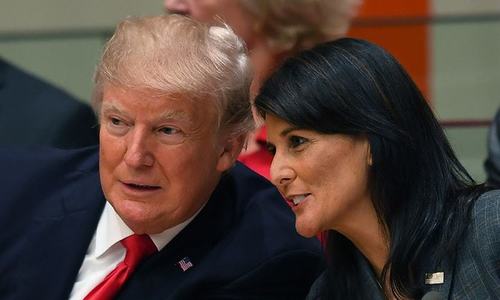The United States vowed on Wednesday to work with India in preference to China over the next century to promote a “free and open” Asia-Pacific region led by prosperous democracies.
Secretary of State Rex Tillerson delivered his unexpectedly sharp message to Beijing on the same day President Xi Jinping opened the Communist Party congress.
His upbeat speech was designed to set the stage for a visit next week to China's main Asian rival India, and to lay out a vision for a 100-year “strategic partnership” between Washington and New Delhi.
But President Donald Trump's chief diplomat also took the opportunity to compare the United States and India — the world's “two greatest democracies” — with China, which he said was undermining the “rules-based international order.”
Coming on the day, Xi opened a party congress designed to further secure his long-term control of what is already one of the most powerful Chinese presidencies in history, Tillerson's address will be seen as provocative.
After the speech, reporters asked a senior State Department official whether it had been intended as a warning or a rebuke to China.
“It's a speech that was designed for many audiences,” he said, smiling.
“The fact that he mentioned China is obviously built into the speech,” he said, speaking on condition of anonymity.
“But this is a speech, obviously, that we hope all countries in the Indo-Pacific region will take to heart.”
Washington and Delhi have been building stronger ties for some time, but Tillerson made one of the clearest cases that the “shared values” underpinning the relationship make India and the United States ideal partners.
As such, the speech also amounted to a warning to great power rival China that Washington will build regional alliances to counter its ever-growing power, while promoting free trade and open sea lanes.
'Provocative actions'
“The United States and India are increasingly global partners with growing strategic convergence,” he said.
“Indians and Americans don't just share an affinity for democracy. We share a vision of the future,” he said, projecting the relationship into the next 100 years.
Promising greater prosperity and security in a “free and open Indo-Pacific,” Tillerson did push India — which has its own range of protectionist laws — to open up its borders to more regional and US trade.
But his harshest words were for China, the Asian economic behemoth and the nearest rival to India's huge population or to the United States' still world-leading economy.
“China, while rising alongside India, has done so less responsibly, at times undermining the international, rules-based order,” Tillerson chided.
“China's provocative actions in the South China Sea directly challenge the international law and norms that the United States and India both stand for.”
The senior US official, briefing reporters to flesh out the themes of the speech, said the idea of a “New Pacific” is a priority for both Trump and Tillerson.
In more concrete terms this would mean a four-way arrangement of Australia, India, Japan and the United States to “anchor” the huge region and set standards for trade and security. Implicitly, this would exclude China.
As it has slowly emerged as a powerful, economy India has avoided entangling alliances, preferring to maintain cautious relations with both Washington and Beijing, but Trump has built warm relations with Prime Minister Narendra Modi.
'Greatest democracies'
“The secretary of state spends a lot of time dealing with problems. India is an opportunity,” the senior official said.
Last month, the chief of India's army warned that China had been “testing our limits” in a recent border stand-off and warned that Delhi's forces must be ready for conflict.
India and China went to war in 1962 over the state of Arunachal Pradesh and China has maintained better ties with Delhi's foe Pakistan.
Tillerson did not directly address August's stand-off on the Doklam plateau in the Himalayas, which is claimed by both China and Bhutan, an ally of India.
But he vowed that Washington “won't shrink from China's challenges to the rules-based order, or where China subverts the sovereignty of neighbouring countries.”
And he approvingly cited US Defense Secretary Jim Mattis' declaration “that the world's two greatest democracies should have the two greatest militarise.”
Tillerson noted the Indian navy now flies the American P-8 surveillance aircraft alongside US forces, and promised to help India in developing a carrier-born strike force.
The secretary was speaking to guests of the Centre for Strategic and International Studies in Washington. He is due in New Delhi next week for talks with Indian leaders.
Trump is also due in Asia next month, including a stop in Beijing where he will try to build on an early rapport he has developed with Xi and push for action to contain North Korea's nuclear threat — a task that may be made harder by the Indian outreach.













































